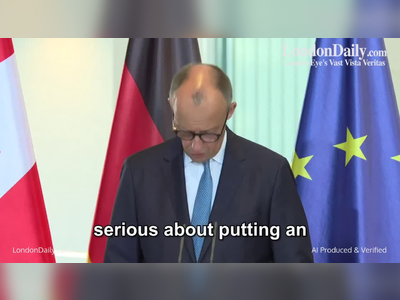France May Need IMF Bailout, Warns Finance Minister
Prime Minister Bayrou faces near-certain defeat in a confidence vote as France struggles with mounting deficits, rising borrowing costs, and political paralysis.
France is facing a dual political and economic crisis that has raised the specter of an International Monetary Fund bailout, according to Finance Minister Éric Lombard.
Prime Minister François Bayrou has called a confidence vote for 8 September, but with the Socialist Party now joining the Greens and the far-right National Rally in opposition, his government lacks the numbers to survive.
Without the Socialists, Bayrou’s centre-right minority administration is expected to collapse, leaving the country without a budget and fueling further speculation about the health of its economy.
Lombard has publicly stated that IMF intervention is “a risk that is in front of us” if fiscal discipline is not restored.
France’s finances have been deteriorating sharply.
The debt-to-GDP ratio, which stood at 113% last year, is projected to climb beyond 120% by the end of the decade.
The government recorded a deficit of 5.8% of GDP last year and aims to cut it to 4.6% by 2026.
Plans to save €44 billion include contentious measures such as scrapping two public holidays.
By contrast, Italy—despite carrying a higher debt-to-GDP ratio of 135%—has tightened expenditure and secured declining deficit projections, with the EU Commission forecasting a fall below 3% by 2026.
Even Greece, with debt at 158% of GDP, currently pays less to borrow than France.
French 10-year bond yields stand at 3.5%, higher than Italy’s and only slightly below the UK’s 4.7%.
President Emmanuel Macron has pressed for unpopular fiscal reforms, including raising the retirement age from 62, arguing that pension costs are dragging the economy and workforce productivity.
His warnings that the “years of abundance are over” have met resistance, leaving Bayrou’s government struggling to win consensus.
The uncertainty has rattled financial markets.
Shares in major French banks, including BNP Paribas and Société Générale, fell sharply as borrowing costs rose.
Analysts at Jefferies said the instability poses more of a threat to growth than to government solvency in the short term, while Goldman Sachs warned that Bayrou may be forced to ease deficit-reduction targets to salvage his administration.
This could provide temporary growth relief but also risk renewed credit rating pressures.
Economic forecasts remain bleak, with growth expected to stagnate at 0.6% in 2025 and 0.9% in 2026.
With no clear majority in parliament willing to unite around a budget, France faces prolonged uncertainty at a moment of intensifying fiscal and political strain.
Prime Minister François Bayrou has called a confidence vote for 8 September, but with the Socialist Party now joining the Greens and the far-right National Rally in opposition, his government lacks the numbers to survive.
Without the Socialists, Bayrou’s centre-right minority administration is expected to collapse, leaving the country without a budget and fueling further speculation about the health of its economy.
Lombard has publicly stated that IMF intervention is “a risk that is in front of us” if fiscal discipline is not restored.
France’s finances have been deteriorating sharply.
The debt-to-GDP ratio, which stood at 113% last year, is projected to climb beyond 120% by the end of the decade.
The government recorded a deficit of 5.8% of GDP last year and aims to cut it to 4.6% by 2026.
Plans to save €44 billion include contentious measures such as scrapping two public holidays.
By contrast, Italy—despite carrying a higher debt-to-GDP ratio of 135%—has tightened expenditure and secured declining deficit projections, with the EU Commission forecasting a fall below 3% by 2026.
Even Greece, with debt at 158% of GDP, currently pays less to borrow than France.
French 10-year bond yields stand at 3.5%, higher than Italy’s and only slightly below the UK’s 4.7%.
President Emmanuel Macron has pressed for unpopular fiscal reforms, including raising the retirement age from 62, arguing that pension costs are dragging the economy and workforce productivity.
His warnings that the “years of abundance are over” have met resistance, leaving Bayrou’s government struggling to win consensus.
The uncertainty has rattled financial markets.
Shares in major French banks, including BNP Paribas and Société Générale, fell sharply as borrowing costs rose.
Analysts at Jefferies said the instability poses more of a threat to growth than to government solvency in the short term, while Goldman Sachs warned that Bayrou may be forced to ease deficit-reduction targets to salvage his administration.
This could provide temporary growth relief but also risk renewed credit rating pressures.
Economic forecasts remain bleak, with growth expected to stagnate at 0.6% in 2025 and 0.9% in 2026.
With no clear majority in parliament willing to unite around a budget, France faces prolonged uncertainty at a moment of intensifying fiscal and political strain.









